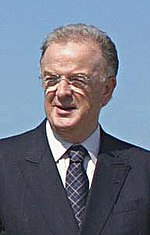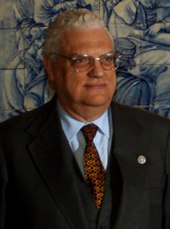Local elections were held in Portugal on 17 December 1989. The elections consisted of three separate elections in the 305 Portuguese municipalities, the election for the Municipal Chambers, whose winner is automatically elected mayor, similar to first-past-the-post (FPTP), another election for the Municipal Assembly and a last one for the lower-level Parish Assembly, whose winner is elected parish president. This last was held separately in the more than 4,200 parishes around the country.
| ||||||||||||||||||||||||||||||||||||||||||||||||||||||||||||||||||||||||||||||||
All 305 Portuguese municipalities and 4,260 Portuguese Parishes All 2,002 local government councils | ||||||||||||||||||||||||||||||||||||||||||||||||||||||||||||||||||||||||||||||||
|---|---|---|---|---|---|---|---|---|---|---|---|---|---|---|---|---|---|---|---|---|---|---|---|---|---|---|---|---|---|---|---|---|---|---|---|---|---|---|---|---|---|---|---|---|---|---|---|---|---|---|---|---|---|---|---|---|---|---|---|---|---|---|---|---|---|---|---|---|---|---|---|---|---|---|---|---|---|---|---|---|
| Turnout | 60.9% | |||||||||||||||||||||||||||||||||||||||||||||||||||||||||||||||||||||||||||||||
| ||||||||||||||||||||||||||||||||||||||||||||||||||||||||||||||||||||||||||||||||
For the first time since democracy was restored, the center-left/left-wing parties won a nationwide local election. The Socialist Party won, also for the 1st time, the status of largest local party, a title the Socialists would hold on until 2001, and gained control in many big cities across the country, like Lisbon and Porto.[9] In Lisbon, the PS leader, Jorge Sampaio, in a coalition with CDU, defeated the PSD/CDS candidate, Marcelo Rebelo de Sousa, by a 49 to 42 percent margin. The Socialists had a net gain of 41 cities, and won important cities like Guimarães, Coimbra, Faro and Vila Nova de Gaia.
The Social Democrats (PSD), were the big losers of the elections. The party lost its status as the largest local party and suffered heavy losses across the country, particularly in the big cities. The PSD lost a total of 35 cities, although was able to increase its share of the vote to 35 percent. The results contrast with the landslide election victory the PSD won in the 1987 general elections. Many of Cavaco Silva's government policies such as privatizations, which was creating some unemployment, or the tensions with some workers unions, like the Police protests in April 1989,[10] may have had a negative effect on the PSD chances.
The Democratic Unity Coalition (CDU) gained 3 cities, compared with 1985, and maintained their control in the Alentejo area. Nonetheless, the Communist/Green coalition suffered a big drop in its share of vote, dropping 6 points to around 13 percent. The CDU was able to hold on to their bastions of Beja, Évora and Almada.
The Democratic and Social Centre (CDS), like PSD, had a very poor showing winning 20 cities, a drop of 7 cities. The party lost some important cities to either the PS or PSD, such as Póvoa de Varzim, Leiria and Viseu. At the same time, CDS made several coalitions with the PS in Azores and Madeira, and, together, the PS/CDS coalition won a combined total of 3 cities. Other smaller parties also made gains, like the UDP which gained Machico, Madeira islands, from the PSD
Turnout in these elections was lower compared with 4 years ago, with 60.9 percent of the electorate casting a ballot.
Parties
editThe main political forces involved in the election were:
- Democratic and Social Centre (CDS)1, 2
- Democratic Unity Coalition (CDU)1
- Socialist Party (PS)1
- Social Democratic Party (PSD) 2
1 The PS formed coalitions with CDS, CDU and MDP/CDE in several municipalities.
2 The PS formed coalitions with CDS and PPM in some municipalities.
Results
editMunicipal Councils
editNational summary of votes and seats
edit| Parties | Votes | % | ±pp swing | Candidacies | Councillors | Mayors | ||||
|---|---|---|---|---|---|---|---|---|---|---|
| Total | ± | Total | ± | |||||||
| Socialist | 1,599,483 | 32.40 | 5.0 | 728 | 154 | 116 | 37 | |||
| Social Democratic | 1,554,245 | 31.49 | 2.5 | 780 | 39 | 113 | 36 | |||
| Democratic Unity Coalition | 633,693 | 12.84 | 6.6 | 253 | 50 | 50 | 3 | |||
| Democratic and Social Centre | 451,126 | 9.14 | 0.6 | 179 | 43 | 20 | 7 | |||
| PSD / CDS / PPM | 193,161 | 3.91 | — | 13 | — | 1 | — | |||
| PS / CDU / MDP/CDE | 180,760 | 3.66 | — | 9 | — | 1 | — | |||
| Democratic Renewal | 38,565 | 0.78 | 4.0 | 4 | 35 | 0 | 3 | |||
| PS / CDS | 34,912 | 0.71 | — | 15 | — | 3 | — | |||
| CDU / PRD | 23,026 | 0.47 | — | 5 | — | 0 | — | |||
| Portuguese Workers' Communist | 21,819 | 0.44 | 0.2 | 0 | 0 | 0 | 0 | |||
| People's Democratic Union | 15,876 | 0.32 | 0.3 | 4 | 1 | 1 | 1 | |||
| Portuguese Democratic Movement | 11,384 | 0.23 | — | 1 | — | 0 | — | |||
| Christian Democratic | 7,189 | 0.15 | 0.1 | 1 | 1 | 0 | 0 | |||
| MDP/CDE / PRD | 3,607 | 0.07 | — | 7 | — | 0 | — | |||
| People's Monarchist | 2,768 | 0.06 | 0.4 | 1 | 3 | 0 | 0 | |||
| Left Revolutionary Front | 2,424 | 0.05 | — | 0 | — | 0 | — | |||
| CDS / PS | 953 | 0.02 | — | 1 | — | 0 | — | |||
| PRD / MDP/CDE | 710 | 0.01 | — | 1 | — | 0 | — | |||
| Democratic Party of the Atlantic | 349 | 0.01 | — | 0 | — | 0 | — | |||
| Total valid | 4,765,968 | 96.55 | 0.4 | — | 2,002 | 27 | 305 | 0 | ||
| Blank ballots | 90,114 | 1.83 | 0.3 | |||||||
| Invalid ballots | 80,328 | 1.63 | 0.1 | |||||||
| Total | 4,936,410 | 100.00 | ||||||||
| Registered voters/turnout | 8,110,493 | 60.86 | 2.1 | |||||||
| Source: Comissão Nacional de Eleições Archived 2014-07-12 at the Wayback Machine | ||||||||||
Municipality map
edit■ - PSD: 113
■ - PS: 116
■ - CDU: 50
■ - CDS: 20
■ - UDP: 1
■ - PSD coalitions: 1
■ - PS coalitions: 4
City control
editThe following table lists party control in all district capitals, highlighted in bold, as well as in municipalities above 100,000 inhabitants. Population estimates from the 1981 Census.[11]
Municipal Assemblies
editNational summary of votes and seats
edit| Parties | Votes | % | ±pp swing | Candidacies | Mandates | |||||
|---|---|---|---|---|---|---|---|---|---|---|
| Total | ± | |||||||||
| Socialist | 1,574,632 | 31.92 | 7.6 | 2,429 | 633 | |||||
| Social Democratic | 1,544,877 | 31.32 | 1.7 | 2,573 | 98 | |||||
| Democratic Unity Coalition | 657,499 | 13.33 | 7.0 | 849 | 207 | |||||
| Democratic and Social Centre | 443,731 | 9.00 | 7.2 | 712 | 303 | |||||
| PSD / CDS / PPM | 195,249 | 3.96 | — | 41 | — | |||||
| PS / CDU / MDP/CDE | 182,237 | 3.69 | — | 28 | — | |||||
| Democratic Renewal | 41,085 | 0.83 | 4.4 | 26 | 247 | |||||
| PS / CDS | 34,043 | 0.69 | — | 41 | — | |||||
| CDU / PRD | 23,456 | 0.48 | — | 18 | — | |||||
| People's Democratic Union | 17,706 | 0.36 | 0.3 | 14 | 0 | |||||
| Portuguese Workers' Communist | 11,029 | 0.22 | 0.1 | 0 | 0 | |||||
| Portuguese Democratic Movement | 9,239 | 0.19 | — | 6 | — | |||||
| Christian Democratic | 4,250 | 0.09 | 0.0 | 3 | 1 | |||||
| MDP/CDE / PRD | 2,762 | 0.06 | — | 4 | — | |||||
| People's Monarchist | 1,859 | 0.04 | 0.3 | 2 | 5 | |||||
| Democratic Party of the Atlantic | 1,355 | 0.03 | — | 1 | — | |||||
| CDS / PS | 982 | 0.02 | — | 4 | — | |||||
| PRD / MDP/CDE | 505 | 0.01 | — | 2 | — | |||||
| Total valid | 4,722,468 | 96.22 | 0.4 | — | 6,753 | 81 | ||||
| Blank ballots | 104,261 | 2.12 | 0.2 | |||||||
| Invalid ballots | 81,410 | 1.66 | 0.2 | |||||||
| Total | 4,908,139 | 100.00 | ||||||||
| Registered voters/turnout | 8,211,821 | 59.77 | 3.4 | |||||||
| Source: Comissão Nacional de Eleições Archived 2017-12-06 at the Wayback Machine | ||||||||||
Parish Assemblies
editNational summary of votes and seats
edit| Parties | Votes | % | ±pp swing | Candidacies | Mandates | Presidents | ||||
|---|---|---|---|---|---|---|---|---|---|---|
| Total | ± | Total | ± | |||||||
| Social Democratic | 1,556,509 | 31.69 | 1.2 | 13,237 | 119 | |||||
| Socialist | 1,522,653 | 31.00 | 4.0 | 11,188 | 2,149 | |||||
| Democratic Unity Coalition | 668,608 | 13.61 | 6.6 | 2,925 | 751 | |||||
| Democratic and Social Centre | 397,164 | 8.09 | 2.4 | 3,444 | 1,087 | |||||
| PSD / CDS / PPM | 189,335 | 3.86 | — | 403 | — | — | ||||
| PS / CDU / MDP/CDE | 183,404 | 3.73 | — | 392 | — | — | ||||
| Independents | 91,533 | 1.86 | 0.5 | 1,009 | 212 | |||||
| PS / CDS | 32,109 | 0.65 | — | 181 | — | — | ||||
| Democratic Renewal | 29,684 | 0.60 | 2.8 | 58 | 668 | |||||
| People's Democratic Union | 24,324 | 0.50 | 0.1 | 30 | 4 | |||||
| CDU / PRD | 22,713 | 0.46 | — | 95 | — | — | ||||
| Portuguese Democratic Movement | 7,610 | 0.15 | — | 13 | — | |||||
| Portuguese Workers' Communist | 4,576 | 0.09 | 0.0 | 0 | 0 | |||||
| People's Monarchist | 1,247 | 0.03 | 0.0 | 9 | 15 | |||||
| Democratic Party of the Atlantic | 1,162 | 0.02 | — | 3 | — | — | ||||
| Christian Democratic | 1,068 | 0.02 | 0.0 | 7 | 3 | |||||
| MDP/CDE / PRD | 952 | 0.02 | — | 5 | — | — | ||||
| PRD / MDP/CDE | 213 | 0.00 | — | 1 | — | — | ||||
| Total valid | 4,731,554 | 96.41 | 0.2 | — | 33,000 | 1,059 | ||||
| Blank ballots | 90,606 | 1.85 | 0.0 | |||||||
| Invalid ballots | 85,834 | 1.75 | 0.2 | |||||||
| Total | 4,907,994 | 100.00 | ||||||||
| Registered voters/turnout | 8,882,933 | 55.25 | 8.3 | |||||||
| Source: Comissão Nacional de Eleições Archived 2019-10-01 at the Wayback Machine | ||||||||||
See also
editReferences
edit- ^ Sum of votes between PS-only lists and lists with other parties.
- ^ Sum of votes between PSD-only lists and lists with other parties.
- ^ Number of municipalities won between PS-only lists and lists with other parties. PS-only lists: 116; PS-coalition lists: 4.
- ^ Number of municipalities won between PSD-only lists and lists with other parties. PSD-only lists: 113; PSD-coalition lists: 1.
- ^ Sum of councillors between PS-only lists and lists with other parties.
- ^ Sum of councillors between PSD-only lists and lists with other parties.
- ^ Sum of votes between CDS-only lists and lists with other parties.
- ^ Sum of councillors between CDS-only lists and lists with other parties.
- ^ "As cores políticas que pintam o mapa do poder local de 1976 a 2013". Jornal de Negócios (in Portuguese). 2017.
- ^ ""Secos e Molhados" na primeira pessoa: (Re)viver a História". Expresso (in Portuguese). 2016.
- ^ "Instituto Nacional de Estatística (Recenseamentos Gerais da População)". www.ine.pt (in Portuguese). Statistics Portugal. Retrieved 17 July 2021.



